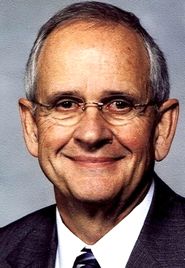 State Sen. John Harms of Nebraska has been pushing for modernized traffic safety laws for most of his time in the Legislature, dating back to 2006. With one year to go, Harms is rounding up his key issues in the ambitious Nebraska Roadway Safety Act bill.
State Sen. John Harms of Nebraska has been pushing for modernized traffic safety laws for most of his time in the Legislature, dating back to 2006. With one year to go, Harms is rounding up his key issues in the ambitious Nebraska Roadway Safety Act bill.
The 2014 bill seeks to eliminate “secondary enforcement” from key Nebraska traffic safety laws, including the ban on texting & driving.
Harms says the bill’s six-part approach may find more success in the Legislature than individual measures, such as several he has carried over from 2013.
The comprehensive legislation “brings closure to a lot of concerns I have had,” Harms said at an introductory news conference Jan. 9. “I’ve always been concerned” about the secondary safety enforcement in Nebraska.
“It will give our law enforcement officers the tools they need,” said Harms, father of the state’s 2010 texting law and its predecessor, which targeted teens.
The state “always seems to be slow in doing this sort of thing. … You have to be committed to the safety aspect (of the law).”
Nebraska is one of the few remaining states that restrict police’s ability to stop and cite offenders of the local texting & driving law. Harms’ legislation would assign primary enforcement status to text messaging while driving (as would his carryover bill from 2013).
The highway legislation also would prohibit use of cell phones by bus drivers.
The roadway safety bill would hike enforcement under the state’s graduated driver’s license law, including its ban on cell phone use by novice drivers. Harms said the current law gives police “no way of addressing” the cell phone ban for teen drivers.
The senator did acknowledge that teens are not the only ones involved in electronic distracted driving.
The Roadway Safety bill, about to be introduced, also would tackle Nebraska’s long-standing ambivalence over seat belt regulation, allowing police to stop vehicles with offenders and cite the driver. It would require all passengers to buckle up, not just those in the front seat. Harms’ carryover seat belt bill from 2013 also would increase the fine from $25 to $100.
“They (young drivers) get lost in this whole thing about excitement and having kids behind them and talking to them, using that cell phone, or texting — that has bothered me for a long time.”
Sen. Harms is leaving the state’s unicameral Legislature due to term limits.
In recent years, the limitations of secondary enforcement has emerged as a key legislative issue in the distracted driving debate. Florida, for example, has just enacted a texting & driving law, but the issue immediately returned to the Legislature because of its secondary status.
The National Safety Council of Nebraska is a key backer of Harms’ six-part legislation. “We can save lives simply by strengthening the laws that are already on the books,” said group president Beverly Reicks.
“Nebraska is one of only 17 states without a primary seat-belt law,” a AAA spokeswoman told the Roadway Safety Act event.
- Read about Nebraska’s seat belt laws.
- Read about Nebraska’s distracted driving laws.


Senator Harms is a breath of fresh air in a polluted legislative environment. Of course, I would have preferred him to go a bit further in his goals, but those that he did state are way overdue and most welcomed. More power to him. It’s too bad he has to leave office due to arbitrary term limits. The voters should decide who goes and who stays … and we need more legislators of his stature.